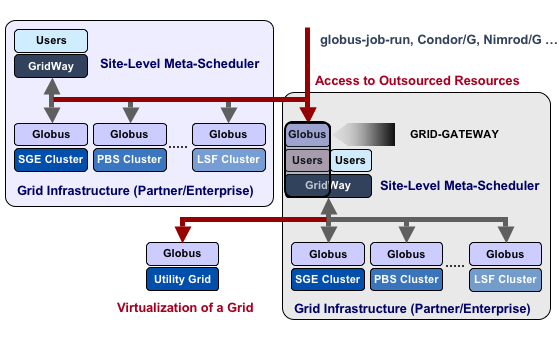| Home | About | Software | Documentation | Support | Outreach | Ecosystem | Dev | Awards | Team & Sponsors | |
GridGateWay: WSRF Interface for GridWay
This component enables the remote access to GridWay's metascheduling capabilities through a WSRF interface. Not all the functionality is accessible this way (array jobs and workflows are not available), but in turn it provides an interface that can be used with globus clients (e.g. globusrun-ws), is accessible through globus APIs (java core, java CoG) and also can be put to work with the various workflow tools based on globus, like, for example, the one offered by java CoG (Karajan).
The advantages of this approach is that is permits the virtualization of a grid (accessible through the encapsulated GridWay) through a WS-GRAM service. The main feature of our model is the use of the WS-GRAM, MDS and RFT services to recursively interface to the services available in a Globus based grid. A WS-GRAM service hosting a GridWay meta-scheduler provides the standard functionality required to implement a gateway to a federated grid, therefore allowing for the creation of hierarchical grid architectures. Such a combination allows the required virtualization technology to be created in order to provide a powerful abstraction of the underlying grid resource management services. Such components are only a first step as other additional components for negotiation, service level agreement, accounting and billing may be required to deploy production-level utility solutions.

The above figure depicts a grid hierarchy in our utility computing model. An enterprise grid, managed by the IT Department, can access a grid gateway to an outsourced grid, managed by a utility computing service provider. The outsourced grid provides pay-per-use computational power when local resources are overloaded; while security, accounting and billing are locally managed at the gateway of the outsourced grid, transparently to the end user. This hierarchical grid organization may be extended recursively to federate a higher number of partner or outsourced grid infrastructures with consumer/provider relationships.
Guides
- Installation and Configuration Guide GridGateWay 1.0.4 [ PDF ]
Software Download
This release of the GridGateWay software (1.0.4) contains a new Globus WS-GRAM scheduler plugin to interface with the GridWay Metascheduler so that jobs submitted to the GRAM service are automatically given to the metascheduler and transferred to a federated Globus grid. The GridGateWay can be downloaded from the following link:
In order to be able to do transparent file staging using globus client tools, an extra package needs to be installed for versions of globus previous to GT4.0.6. Pick one that meets your globus version:
Support
Support for these components will be given through GridWay User mailing list. You can subscribe to it following the steps described at globus mailing list guide, the list to subscribe is called “gridway-user”. You can also use this link to subscribe if your mail application is configured to follow “mailto:” links.
Gridway is an open source development effort. All new components developed as part of the GridWay research are released as “open source” under the the Apache License, Version 2.0. The Apache license allows software to be used by anyone and for any purpose, without restriction. Copyright 2002-2007 GridWay Team, Distributed Systems Architecture Group, Universidad Complutense de Madrid
Release Schedule
| Version | Date |
|---|---|
| Release 1.0.4 | April 15, 2008 |
| Release 1.0.3 | July 10, 2007 |
| Release 1.0.2 | May 30, 2007 |
| Release 1.0.1 | March 9, 2007 |
| Release 1.0 | March 1, 2007 |
| Release 0.9 | July 19, 2006 |
Development
The development of the project is hosted at http://dev.gridway.org/projects/gridgateway.